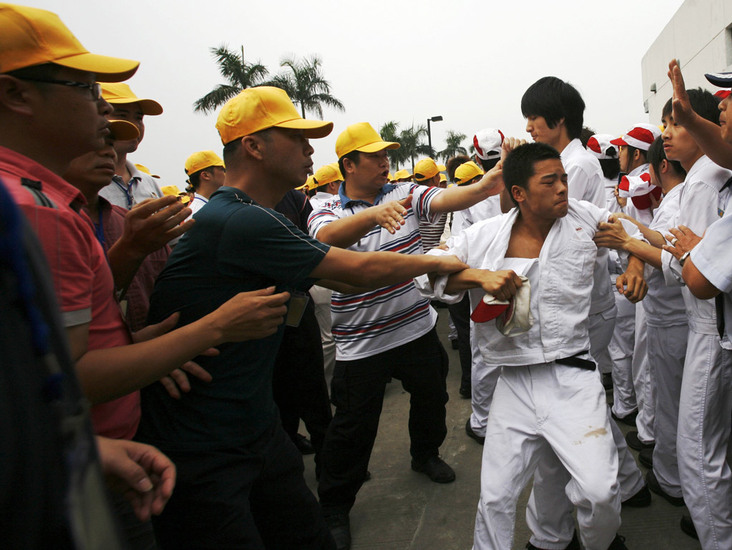China

[For more discussion on China's economic and political development, click HERE.]
The following petition, organised by the Hong Kong-based coalition Left21, explains the background to, and demands of, the rebellion by the people of Wukan.
* * *
China: Marxism with capitalist characteristics?

[For more discussion on China's economic and political development, click HERE.]
Ian Parker reflects on a recent visit to China
November 9, 2011 -- Socialist Resistance -- Capitalism in China is rapidly uprooting and throwing into the marketplace all that seemed fixed and frozen since the revolution in 1949, but -- as with all other forms of capitalism -- this market is all but free. The bureaucracy holds in place systems of authority necessary for capital accumulation, and the Chinese state is a key player in the enrichment of a new bourgeoisie. There are particular political-economic and ideological conditions for this transition, of course, and one of the most important is the legacy of Maoism, and how the claim to be a socialist country is squared with the rapid abandonment of each and every tenet of socialism.
Occupy Sydney, October 15, 2011. Photos by Kate Ausburn.
October 16 , 2011 -- Links International Journal of Socialist Renewal -- According to http://15october.net, protests and actions -- inspired by the Occupy Wall Street mass movement across the United States -- were to take place in more than 950 cities in more than 80 countries on October 15. Actions had already begun in some parts of the world before that.
China: 'Smashing the iron rice bowl' -- expropriation of workers and capitalist transformation

"Managers have powerful market-based incentives that their predecessors did not—fines, bonuses and the threat of termination." Graphic by Jon Berkeley.
By Joel Andreas
October 2011 -- China Left Review, #4 -- In debates about whether the economic order that is emerging in China after three decades of market reforms can be called capitalist, the main focus has been about trends in the relative importance of private and state enterprises and the role of the state in the economy. These are important issues, of course, involving fundamental features of capitalism. Much less attention, however, has been given to employment relations.
In this paper, which focuses on the restructuring of urban enterprises beginning in the early 1990s, I argue that the dismantling of the old “work unit” system and the elimination of permanent job tenure have effectively severed ties between labour and the means of production. This has changed not only the nature of employment relations, but the fundamental goals of economic enterprise, establishing the foundations for a capitalist economic order.
Martin Hart-Landsberg: The troubled US economy means a shaky world economy

By Martin Hart-Landsberg
August 15, 2011 -- Reports from the Economic Front, posted at Links International Journal of Socialist Renewal with Martin Hart-Landsberg's permission -- The US economy is in trouble and that means trouble for the world economy. According to the United Nations Conference on Trade and Development’s Trade and Development Report, 2010, “Buoyant consumer demand in the United States was the main driver of global economic growth for many years in the run-up to the current global economic crisis.”
Before the crisis, US household consumption accounted for approximately 16 per cent of total global output, with imports comprising a significant share and playing a critical role in supporting growth in other countries. In fact, “as a result of global production sharing, United States consumer spending increas[ed] global economic activities in many indirect ways as well (e.g. business investments in countries such as Germany and Japan to produce machinery for export to China and its use there for the manufacture of exports to the United States)”.
Vietnam: Extraordinary petition by 'patriotic personalities'

By Michael Karadjis
July 29, 2011 -- Vietnam from the Left, posted at Links International Journal of Socialist Renewal with the author's permission -- Below is an extraordinary document initiated by some 20 prominent Vietnamese academics, former military figures, former officials, writers etc, who express great unease about the current situation for Vietnam, faced on the one hand by increasingly aggressive Chinese actions in the East Sea (also known as the South China Sea), and on the other by an economic situation characterised over the last few years by mounting crisis and severe inflation, which is hammering people’s living standards.
Should China create a law on workers' strikes?

State-backed "trade union" officers (in yellow caps) harrass striking workers at the Nanhai Honda plant in 2010.
July 20, 2011 -- China Labor News Translations, posted at Links International Journal of Socialist Renewal with permission -- Even though strikes frequently occur across China, the country actually has no law regulating labour strikes. There is no law permitting strikes, but at the same time there is no law banning them.
Capitalist globalisation and the environment: Offshoring carbon emissions
By Martin Hart-Landsberg
June 12, 2011 -- Reports from the Economic Front, posted at Links International Journal of Socialist Renewal with the author's permission -- More than 3000 participants from 183 countries are attending a two-week UN sponsored climate gathering in Bonn, Germany. The talks are supposed to help prepare the agenda for COP 17, or as it is more formally known, the 17th Conference of the Parties of the United Nations Framework Convention on Climate Change (defenders of the environment have renamed the meeting the Conference of Polluters) which will take place November 28 to December 9, 2011, in Durban, South Africa.
The cost of climate inaction grows worse. As the Earth Island Journal reports:
China: Capitalist globalisation and its consequences

'China is not stealing jobs from anyone. The globalisation process is erasing jobs everywhere, including in China'
By Martin Hart-Landsberg
June 6, 2011 -- Reports from the Economic Front, posted at Links International Journal of Socialist Renewal with the author's permission -- Although capitalism has always been a global system, the international integration of production and finance and our dependence on cross-border activities seems greater than ever before. At the risk of oversimplifying, we now have a world system within which Latin America, Africa and the Middle East specialise in the production and export of primary commodities, increasingly to East Asia.
East Asia operates as the world’s manufacturing hub, exporting final products to the developed capitalist world, especially the United States.And the United States specialises in providing the finance that underpins the international production system and developed capitalist country consumption.


